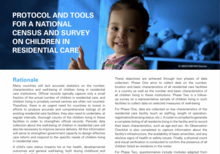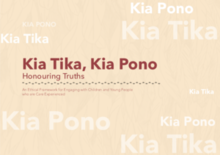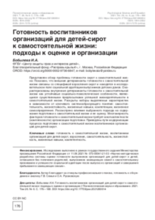Displaying 101 - 110 of 721
The Data and Analytics Section at UNICEF Headquarters developed a data collection protocol and tools for conducting a census of residential care facilities, the enumeration of children, and a survey of child well-being that can be replicated and adapted in a variety of country contexts.
This is an ethical framework to guide engagement with tamariki (children) and rangatahi (young people) who are care experienced (that is, who currently or at some stage in their lives have been in foster or residential care).
The objective of the study was to evaluate the health and nutritional status of four registered orphanages of Rawalpindi, to find frequency of nutritional deficiencies by physical examination findings and to assess their dietary intake and contrast it with individual recommended daily allowances.
Watch the launch of a ground-breaking report: Cycles of Exploitation: The Links Between Children’s Institutions and Human Trafficking. The report makes recommendations for breaking the complex cycles of exploitation that trap children and let traffickers go free.
This Global Thematic Review examines the growing evidence of the links between the institutionalisation of children and human trafficking. It highlights how the relationship between the two compounds the harmful nature of both phenomena and offers insight into the global response needed.
Más Allá del Cuidado Institucional proporciona un marco para que los gobiernos desarrollen su propia hoja de ruta para la reforma de sus sistemas de protección y cuidado infantil y la desinstitucionalización. Esperamos que esto inspire el diálogo, guíe las conversaciones entre grupos interministeriales y en la sociedad, oriente a grupos
multidisciplinarios de todos los niveles en la creación de su propia evaluación y ayude en la planificación de su propia hoja de ruta para el cambio.
Au-delà des soins institutionnels fournit un cadre aux gouvernements pour développer leur propre feuille de route pour la réforme et la désinstitutionnalisation du système de protection et de garde des enfants. Nous espérons qu'il inspirera une conversation, guidera le dialogue interministériel et interprofessionnel, soutiendra les groupes multidisciplinaires à tous les niveaux pour encadrer leur propre évaluation et planifier leur propre feuille de route pour le changement.
Представлен обзор проблемы готовности сирот к самостоятельной жизни. Показано, что внешние детерминанты готовности к самостоятельной жизни связаны со спецификой взросления сирот и находятся в исследовательском поле социальной адаптации выпускников детских домов.
Low readiness for independent living is what underlies the problems of social adaptation in children and adolescents from orphan organizations. This review explores how scientists and practitioners interpret this very concept of readiness for independent living.








